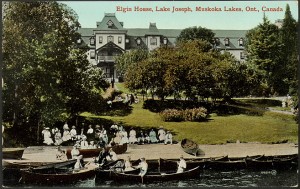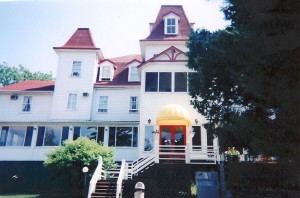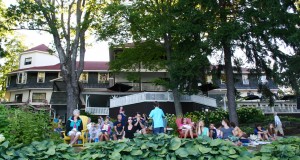Development, including more paved roads and hardened surfaces, bigger septic systems, and an increase of fertilizers and phosphates in the water, has had a negative impact on the natural environment of Muskoka.
But there is another equally harmful quality of development: the destruction of the cultural heritage of Muskoka.
The increasing rates of taxes on waterfront properties has been particularly burdensome to the resorts, which in turn caused many to be put up for sale in the beginning of the 21st century. With consumer interests changing, the old style “lodge” of many resorts seemed too basic to developers, not modern enough for today’s vacationer—not to mention not designed properly for fractional ownership.

Elgin House was one of the first old-style resorts to be torn down in favour of redevelopment.
Photo courtesy of the Toronto Public Library Digital Archives.
But in their attempts to bring something new to Muskoka, something to attract tourists, something to preserve the economy, developers inadvertently destroyed the very essence of Muskoka that just could have been the ticket to luring people back.
In the first decade of the 21st century, several historic Muskoka hotels were demolished, much to the chagrin of historian Liz Lundell, who sat on the Township of Muskoka Lakes’ heritage committee at that time and tried to save many of these buildings by lobbying for them to be designated heritage properties. In 2006, the committee infamously disbanded, saying that what they were trying to do—and preserve—was not being taken seriously.
When Elgin House was torn down by Club Link in the mid-1990s for development, it was a bit of an anomaly. But one by one the bulldozers moved on the resort lodges of yesteryear.
“There were a bunch of resort properties that became of interest and seemed to be in danger of uninformed development,” Lundell recalls of her time on the heritage committee. “Back in the ‘80s, the former committee had put together a list of important buildings in the township that told the story of the community and of the development of the community, and that everybody recognized quite widely as being ‘significant’ buildings.”
“A number were under threat of demolition.”
Among them were Tamwood Lodge and Aston Villa, bought by developers to make way for Touchstone Resort, a fractional ownership property. The main log building of the old Tamwood Lodge was one that Lundell and the rest of the committee recommended be designated a heritage building by the Township of Muskoka Lakes. Despite an even split in council, the motion did not pass, and thus the building was demolished so the developers could use the land.
For Lundell, this was a particularly frustrating case.

Pinelands had a very distinctive-looking lodge with a bright red roof. The resort was situated on a sandy shoreline of Lake Joseph.
Photo courtesy of Judy Embleton
“That was 2005 (that the motion didn’t pass), and here we are at 2012 and nothing has been done yet on that property,” she says. “There was no urgent need to take it down for development.”
Another historic hotel on the chopping block was Pinelands Resort. Developer Walter Prichydny claims that at the time of its demolition, the lodge was defunct and could not be repaired, though the heritage committee considered that from an architectural standpoint, there was nothing about the building that couldn’t be fixed. But it didn’t matter; it was knocked down.
One by one, they went. Among them, Marygrove, the former Glen Home hotel formerly owned by the same owner as Elgin House, and Bangor Lodge, which stood across the lake from Tamwood, each architecturally significant buildings with their own rich history within the greater context of Muskoka’s story.
After several of the heritage committee’s recommendations were denied by the Township of Muskoka Lake’s council, which was then beginning to entertain the idea that a structure could not be designated a heritage building if the owner did not want it to be, the entire heritage committee disbanded, saying they felt their work was not making a difference.
This is not to say, of course, that the former council was pro-development and anti-heritage. No, it is not that black and white.
One by one the bulldozers moved on the resort lodges of yesteryear.
But Muskoka’s struggles over how to attract visitors has caused a great deal of political tension, as no one is clear on how to achieve that goal. In the Township of Muskoka Lakes election of 2010, every single incumbent on the council, along with the mayor, was defeated.
But it is important to remember what has happened over the last five to seven years. The demolitions of the older resorts came at the precipice of the recession of 2007, when development pressure was at its peak and the seemingly great potential for making money off new, upgraded, luxury hotels and fractional ownership accommodations was top priority.
But unfortunately, it is hard to rebuild what once was (perhaps the only exception is Windermere House: the original building burnt down during a movie shoot in 1996 and an exact replica was built in its place, open for guests a year later).
Development in other forms has caused political friction, as well.
In 2007, Hanna’s Landing, Inc., proposed to build a 250-unit sub-division development on a waterfront area just outside of the boundaries of the Township of Muskoka Lakes. The company petitioned the Township to expand its boundaries so as to include the new development on the water and sewage lines, and the Township agreed. The Muskoka Lakes Association and Friends of Port Carling, a citizen’s group that formed to overturn the decision, fought it all the way to the Ontario Municipal Board in late 2011, arguing the proposed development would put too much density at the waterfront, significantly harming the environment.
The development won the appeal, though with some minor changes, giving them the go-ahead to build, and as of summer 2012, developing consultant Doug Bryden insists that Hanna’s Landing will “redefine Port Carling.”
But at the moment, it all appears to be moot, for as of 2013, nothing has been done to the property.
And from Muskoka residents and cottagers, there is a tangible amount of developer distrust. At a public meeting on Aug. 17, 2012 at Cleveland’s House resort in Minett, representatives from Ken Fowler Enterprises, the original developer of nearby Red Leaves and current owner of Cleveland’s House, discussed their plans to develop the old Lakeside Lodge property, one lot over from Cleveland’s House.

Permanent and seasonal residents of Minett worry another development will put too much pressure on the already aging structure of Cleveland’s House.
Photo by Erin Morawetz
The crowd buzzed during the presentations. And when the chance came for members of the audience to share their concerns, many did, the main one being that the property would be turned into condominiums and thus bring too much boat traffic, not enough on-site management, and too much pressure on Cleveland’s House to provide resort amenities.
But the true meaning behind all their words came when one attendee stood up and said, “How do we trust you?”
Because they’ve heard it all before.
It seems that everything Muskoka does in attempts to save its tourism industry and economy places the unique qualities, character, and landscape of the region more and more at risk.